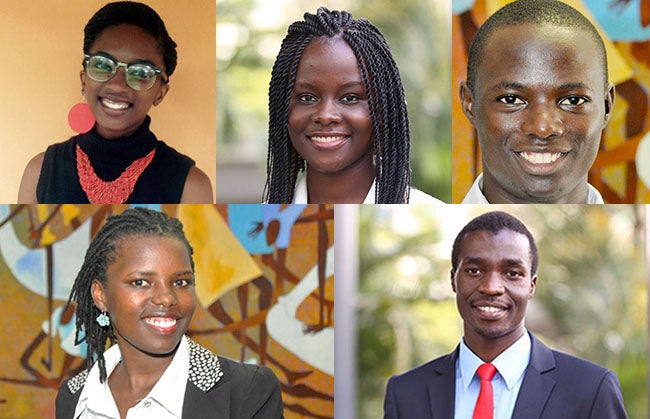
Meet Dominique, Fionah, Jeremiah, Mercy, and Stephen: five winners of the 2016 Blog4Dev. They are from Kenya, Rwanda and Uganda, and represent Africa’s brightest minds and change agents.
Dominique Uwase Alonga from Rwanda is 23 and the author and founder of ImagineWe, an NGO that helps boost the reading culture among youth and teach them not only how to read and write but also how to be creative and innovative. (Read her blog)
Fionah Komusana from Uganda is 25, a third year law student and an experienced blogger who writes about current affairs. She is passionate about helping youth discover their passions and dreams and be nurtured to do it well. (Read her blog)
Jeremiah Kerongo Riro from Kenya is 25 and owns a small business consultancy. He advocates for streamlined agribusiness, boosting opportunities for youths by turning small scale, low-productive farms into large agro-businesses. (Read his blog)
Mercy Anyango Okoth from Kenya is 19 and a third year university student. She believes in the power of technology in improving record keeping and financial projections. She developed a mobile platform and application to help SMEs estimate their financial projections. (Read her blog)
Stephen Katende from Uganda is 25 and is a fellow with ‘Building Tomorrow’s Youth,’ a program that creates incubation centers in various districts. He is raising awareness about high school drops-out rates and started the Restore Dignity campaign to sensitize schools and communities about menstrual hygiene. (Read his blog)
We invited them to the World Bank and asked: what will it take to create opportunities for today’s youth?
Their responses didn’t disappoint. With fresh perspectives and great sense of possibilities, they shared their passion, their source of motivation and aspirations. They talked about success – of making dreams happen even in challenging environments and making a difference in the world. For everyone in the room, the future felt bright and the possibilities endless.
How did they make their dreams happen? Resilience, consistency, motivation, hard work and persistence got them through. And they did not do it alone: having people who believe in them, who can inspire and support their dreams, having mentors and advisors and the means to access networks for visibility and exposure matter a lot. But it wasn’t always easy to get their voices heard.
We asked about aspirations of today’s youth. One noted “I did not want to wait for the government to help me, so I took matters into my own hands and decided to do something about it.” Another explained how geography, society, culture, and parents’ expectations affect the scope of their work and their ability to make things happen.
They highlighted inequality as one of the key issues impacting young people in Africa. Young people who have access to opportunities can afford better education but interestingly face strong pressure on who they should become - a doctor, an engineer -- professions that make their parents happy. The less fortunate have to move from rural areas and cities in search for stability. They sometimes face harsh conditions, often working on low quality jobs, saving to send money to their families back home.
For us in the room, this conversation begged many questions: How can we, as development workers, engage with and empower youth so that they can continue to be powerful agents of change? How can we help to create a level playing field for today’s youth?
The answers admittedly will take a lot of work, strong partnerships from key stakeholders (and many more blogs). But in the meantime, we left with a sense of hope. As one of our guests said: “Be who you are. If you love what you do, believe in it. Your voice will be heard”.



Join the Conversation